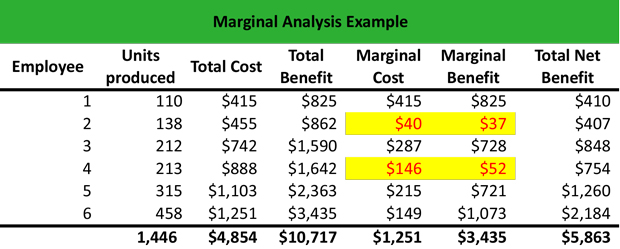Definition: Marginal analysis is a cost-benefit study of a business activity to see if the additional benefits gained by taking an action is worth the cost incurred to take the action. Management uses this to analyze the complexities of a system with respect to its variables and find a way to maximize profits.
What Does Marginal Analysis Mean?
What is the definition of marginal analysis? Decision-makers take into consideration cost and production variables, such as the units produced, to determine how the firm’s profitability changes based on incremental changes in these variables.
Managers use marginal analysis as a profit-maximization tool that performs a cost-benefit analysis of a marginal change in the production of a good or a service, seeking to determine how an incremental change in production volume can affect the business operations.
Governments evaluate the costs and benefits associated with a governmental decision and allocate their resources efficiently to generate extra benefits for the public good.
Let’s look at an example.
Example
Anthony is a Human resources manager in a company that sells sunglasses. The company employs six workers in the production process and Anthony wants to perform an analysis to develop an efficient compensation program.
Each worker produces a different number of units, and the analysis will provide information on each employee’s marginal cost and marginal benefit. Anthony creates a file for the six employees with the following information:

This system allows Anthony to determine which employees are profitable and which are not. The employees who are profitable create more value than their compensation, whereas the loss-making employees create less value than their compensation. By taking a close look at the file, Anthony concludes that employee 2 and employee 4 are creating less value than their compensation as the marginal cost is higher than the marginal benefit.
Obviously, these employees are not using the organizational resources effectively. In this case, Anthony must determine how he should allocate the scarce resource so that these two employees perform at a level that marginal benefit equals marginal cost or exceeds it.
Summary Definition
Define Marginal Analysis: Marginal analysis is a management strategy that involves evaluating the costs and benefits of undertaking additional activities in an effort to maximize company profits.


